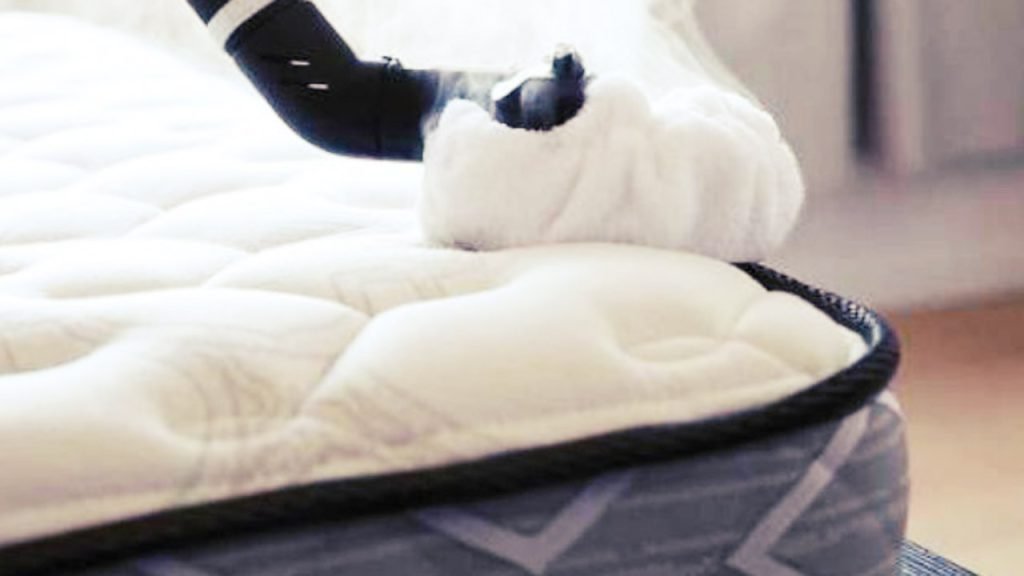I’m a professional copywriting journalist, and I’ve been looking into dry cleaning for bed bugs. Bed bugs can really mess up our homes and clothes. In this article, I’ll talk about bed bugs, how they affect our fabrics, and if dry cleaning works.
Bed bugs are a big problem that can happen anywhere. It’s important to know about them and how to spot an infestation. We’ll look at dry cleaning and if it can get rid of bed bugs. We’ll also talk about other ways to deal with them.

Image by bondcleaningintownsville
By the end of this article, you’ll know a lot about dry cleaning and bed bugs. You’ll also understand the need for professional pest control and how to prevent bed bugs. This knowledge will help you protect your home, clothes, and peace of mind.
Bed Bug Infestations
Bed bugs can be a real nuisance. Knowing how they work and spotting them early is key to solving the problem. As a professional writer, I aim to share useful info about these tiny pests.
What Are Bed Bugs?
Bed bugs are small, flat, oval insects that feed on human blood. They’re about the size of an apple seed and hard to see at first. These pests can live for months without eating and hide in tiny spaces, making them tough to beat.
Signs of a Bed Bug Infestation
Spotting the signs of bed bugs is the first step to fixing the issue. Look out for:
- Itchy bites, often in a straight line or clusters, on the skin
- Small blood spots on bedding or mattresses
- The presence of the insects themselves, either in hiding or crawling on surfaces
- A sweet, musty odor in the affected area
If you think you have bed bugs, act fast. Get a pest control expert to help. Waiting too long can make the problem worse, leading to a big headache and a big bill.
Here’s another post you might find useful: How long does it take to get dry cleaning back
Impact of Bed Bugs on Clothing and Textiles
Bed bugs can be a big problem, especially for our clothes and textiles. These tiny pests can easily get into fabrics, causing many issues. From clothes to upholstery, knowing how they affect us is key.
One major worry is fabric infestation. Bed bugs hide in seams and folds, making them hard to find and get rid of. They can leave stains, smells, and even damage the fabric. This is a big deal for places like hotels and laundry services, where keeping textiles clean is essential.
Bed bugs also make laundry tough. Washing and drying alone might not kill them, leading to more cleaning and treatment. This adds time, effort, and cost, causing problems for both people and businesses.
| Impact | Potential Consequences |
|---|---|
| Fabric Infestation | Staining Odors Structural damage |
| Laundry Challenges | Re-infestation Increased cleaning and treatment measures Time and cost implications |
To tackle bed bug problems in clothes and textiles, we need a few steps. We must prevent, detect early, and treat them well. By understanding their impact, we can protect our textiles and keep our spaces clean and healthy.
You might also be interested in: Does Steam Cleaning Work for Dry Cleaning?
Does Dry Cleaning Get Rid of Bed Bugs?
Many people think dry cleaning can solve bed bug problems. The high heat and chemicals in dry cleaning can kill bed bugs and their eggs. But, whether dry cleaning works depends on several things.
The Dry Cleaning Process
Dry cleaning uses chemicals, not water, to clean clothes. Here’s how it works:
- Pretreatment: Clothes get checked for stains and treated.
- Cleaning: Clothes go into a machine with a chemical solvent, like perc.
- Drying: Clothes are dried with warm air.
- Pressing: Clothes are steamed and pressed to look good.
Effectiveness Against Bed Bugs
The heat and chemicals in dry cleaning can kill bed bugs. The machine’s heat and movement help remove bed bugs. The chemicals also go deep into the fabric, making it hard for bed bugs to survive.
But, dry cleaning might not work for all bed bug problems. For serious infestations, more steps might be needed. It’s key to choose a trusted dry cleaner and tell them about the bed bug issue to get the best results.
| Dry Cleaning Process | Effectiveness Against Bed Bugs |
|---|---|
| Heat and chemical solvents | Can kill bed bugs and their eggs |
| Physical agitation of the machine | Helps dislodge and remove bed bugs from fabrics |
| Severity of the infestation | Severe infestations may require additional pest control measures |
Alternative Methods for Bed Bug Elimination
Dry cleaning can help with bed bug problems, but it’s not always enough. For big infestations, other methods like heat treatment and insecticides might be needed. These can get rid of bed bugs in homes or businesses.
Heat Treatment
Heat treatment is very effective against bed bugs. It heats a room or whole house to kill bed bugs and their eggs. Pest control experts use special gear to make sure the heat gets to all hiding spots.
Insecticides and Pest Control Services
For some infestations, using insecticides and pest control services is best. Insecticides are applied where bed bugs hide. Pest control experts use many methods, including:
- Thorough inspections to find all infested spots
- Using approved insecticides in key areas
- Monitoring and follow-up treatments to make sure bed bugs are gone
- Advice on how to stop bed bugs from coming back
By trying these methods, along with dry cleaning, you can get rid of bed bugs. This helps keep them from coming back.
Don’t miss out on related tips: Read this next: How Long for Couch to Dry After Cleaning
Preventing Bed Bug Infestations
Preventing bed bug infestations starts with proactive pest control and early detection. Regular inspections for signs of bed bugs can greatly reduce the risk of an infestation. This approach makes it easier and less costly to manage the problem.
Inspection and Early Detection
It’s important to regularly check your home for bed bugs. Look for signs like small blood stains on bedding, shed skins, or the bugs themselves. Focus on areas like beds, furniture, and cracks and crevices to catch an infestation early.
- Conduct thorough inspections of your home on a regular basis.
- Check for signs of bed bugs, including blood spots, shed skins, and the bugs themselves.
- Focus on areas where bed bugs are most likely to hide, such as beds, furniture, and cracks and crevices.
- If you suspect an infestation, contact a professional pest control service for a comprehensive inspection and treatment plan.
By being proactive, you can avoid the trouble and costs of a bed bug infestation. Regular checks and early detection are key to keeping your home pest-free.
Don’t miss out on related tips: Read this next: How to Treat Velvet Sofa and Keep It Clean?
Importance of Professional Pest Control
Professional pest control specialists are key in tackling bed bug infestations. They have the skills, tools, and experience needed. They can accurately find the problem, plan a treatment, and get rid of bed bugs completely.
Trying to handle bed bugs yourself can be tough. These pests hide in tiny spots, lay many eggs, and spread fast. Pest control experts use integrated pest management and extermination services to get rid of bed bugs for good.
- Comprehensive inspection and assessment of the infestation
- Customized treatment plans using a combination of methods
- Effective bed bug treatment solutions, such as heat treatment or insecticides
- Ongoing monitoring and follow-up to ensure complete elimination
- Expertise in identifying and addressing the root causes of the infestation
Working with a trusted professional pest control company means your bed bug problem is in good hands. You’ll get safe, effective, and lasting solutions. This saves you time, money, and stress from dealing with bed bugs yourself.
| Service | Description | Advantages |
|---|---|---|
| Professional Pest Control | Comprehensive assessment, customized treatment plan, and ongoing monitoring by experienced technicians | Effective elimination of bed bugs, prevention of future infestations, and peace of mind for homeowners or business owners |
| DIY Bed Bug Treatment | Homeowner-applied insecticides, heat treatments, or other methods without professional guidance | Potentially less expensive in the short-term, but risks incomplete treatment and the recurrence of the infestation |
Dry Cleaning Services for Bed Bug Elimination
Dry cleaning can be a key part of fighting bed bugs. Services that focus on cleaning fabrics can get rid of bed bugs from your clothes and bedding. But, picking a trustworthy dry cleaner is essential for success.
Choosing a Reputable Dry Cleaner
Not every dry cleaner is good at removing bed bugs. Look for one with a history of success in treating fabrics for bed bugs. Here are some tips to find the right one:
- Ask about their experience and expertise in dealing with bed bug issues. A good dry cleaner should have specific training and protocols for bed bug elimination.
- Inquire about the dry cleaning methods they use and how effective they are at killing bed bugs and their eggs. The cleaning process should involve high heat or specialized chemical treatments.
- Check reviews and ask for references to ensure the dry cleaner has a reputation for quality service and reliable pest control results.
- Look for a dry cleaner that offers additional services, such as textile cleaning and disinfection, to provide a comprehensive solution for your bed bug problem.
Choosing a reputable dry cleaner for bed bug removal means your clothes and bedding will be well taken care of. This helps get rid of bed bugs in your home.
You might also be interested in: How Much Does Upholstery Cleaning Cost
Addressing Bed Bug Concerns
Safety and Environmental Considerations
Dealing with bed bugs means focusing on safety and the environment. Traditional methods use harsh chemicals that can harm people and the planet. I’m looking for safer, greener ways to keep my home and family safe.
Options like heat treatment and targeted insecticides are safer and more eco-friendly. These methods can get rid of bed bugs without using harmful chemicals. I’ll work with experts to make sure any treatments are safe and good for the planet.
Keeping up with new bed bug management methods helps me make smart choices. I want to control pests without harming my family or the environment. With the right approach, I’m sure I can solve my bed bug problems safely and sustainably.

I’m Allen Kim, the chief editor of plumbinginto. I am a mid level plumber and assign to an local firm over 4 years of experience. During the working period, most of my experience is related to the house plumbing. I learned about the thing, when working with most experienced people in this sector, one must be as good as the inspector or better with knowledge of the project as well as the practical aspects of plumbing industry.